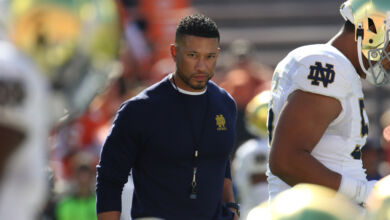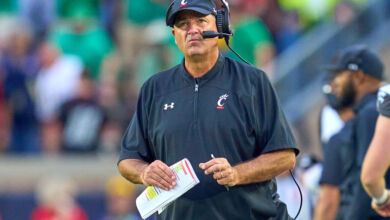Former long time Notre Dame assistant coach Joe Yonto passed away Sunday night.
Tim Prister had a very nice tribute to Yonto on Irish Illustrated that is worth a read for anyone who has the time. Here’s one of the better excerpts.
People often throw the term “Notre Dame man” around a bit loosely. But trust me when I tell you that in my 30 years of involvement with Notre Dame, as a student-athlete to a journalist that has covered Notre Dame for more than a quarter of a century, Joe Yonto ranks among the top five most impressive men I’ve known with an affiliation to the school. I would make that statement regardless whether he defended me during the transitional years of my career or not.
UND.com had a special piece on Yonto prior to the beginning of the 2006 season.
Yonto was a peerless defensive coach. In addition to masterminding national championship defenses in 1966 and 1973, Yonto led the 1980 defense through five straight games without giving up a touchdown, culminating in a 7-0 shutout of number-four Alabama in Birmingham. With that resume, Yonto would be in huge demand for head coaching vacancies today – but he has no regrets.
“My goal in life was to make it to Notre Dame,” he says. “There was no sense in going anywhere else. I was there for 31 years (as a coach and special assistant to the athletic director) and they treated me great.
Joe Yonto, hailing from Orrville, Ohio, embarked on a storied journey at the University of Notre Dame, where his legacy as a player and coach left an indelible mark on the football program.
Yonto’s affiliation with Notre Dame began in the mid-1940s, where he showcased his prowess as a fullback in 1945 and transitioned to guard the following year. However, fate intervened during his senior year in 1948 when a leg injury curtailed his playing career. Undeterred, Yonto seamlessly transitioned into coaching, assuming the role of assistant freshman team coach, thus commencing his illustrious coaching tenure.
However, it was in 1964, under the helm of legendary coach Ara Parseghian, that Yonto’s coaching odyssey reached its pinnacle. Tasked with coaching the defensive line, Yonto proved instrumental in Notre Dame’s defensive prowess, a role he dutifully fulfilled throughout Parseghian’s 11-season tenure. His expertise extended beyond Parseghian’s era, as he continued his coaching tenure for six more seasons under coach Devine, eventually ascending to the role of defensive coordinator during his final four seasons from 1975 to 1980.
Yonto’s tenure coincided with Notre Dame’s most recent golden era, witnessing the triumphs of three national championships in 1966, 1973, and 1977. His coaching acumen was further underscored by the development of a dozen All-America defensive linemen, including luminaries such as Alan Page, Kevin Hardy, and Ross Browner, all of whom attained first-round selections in the NFL draft. Notably, Browner’s accolades included the Lombardi, Outland, and Maxwell Awards, emblematic of Yonto’s adeptness in nurturing football talent.
Under Yonto’s stewardship, Notre Dame’s defensive line attained excellence, consistently ranking among the nation’s top units. The defensive juggernauts engineered by Yonto conceded fewer than 100 rushing yards per game on eight occasions, with the 1974 squad topping the nation in both rushing defense and total defense.
Following the conclusion of the Devine era, Yonto assumed multifaceted roles within the Notre Dame athletics sphere. Serving as a special assistant to athletic directors Gene Corrigan and Dick Rosenthal during the Faust years from 1981 to 1991, Yonto’s administrative prowess complemented his coaching pedigree. His enduring commitment to Notre Dame manifested in his representation of the university and athletics department at various events, culminating in his honorary coaching role at the 2007 Notre Dame Blue-Gold spring football game.
Joe Yonto’s legacy transcends mere statistics; it epitomizes a lifelong dedication to Notre Dame football, embodying the values of perseverance, excellence, and unwavering commitment to the Fighting Irish tradition.



